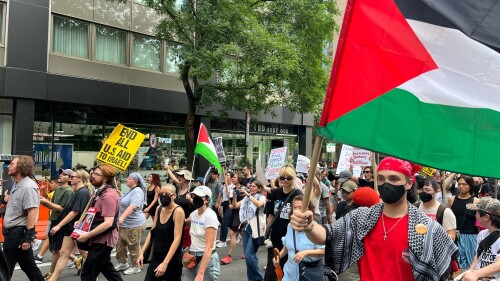Populist outrage in Iraq continues after a U.S. airstrike killed a senior Kata’ib Hezbollah commander on February 7, 2024. A military spokesman said the commander, later identified as Abu Baqir al-Saadi, was “responsible for directly planning and participating in attacks on U.S. forces in the region.”
There followed demands from Iran-backed militiamen and the politicians who support them that the United States withdraw its forces from Iraq. General Yehia Rasool, an Iraqi military spokesman, for example, told National Public Radio, “This trajectory compels the Iraqi government more than ever to terminate the mission of this coalition, which has become a factor for instability and threatens to entangle Iraq in the cycle of conflict.” The Biden administration, meanwhile, seems prepared to abide by such demands.
Do Iraqis really want the United States to withdraw, though? Iraqi politicians have long played a double game with regard to Iranian-backed militias because of both fear and ambition. Iraqi leaders fear that any crackdown upon these militias could result in retaliatory violence. After former Prime Minister Mustafa al-Kadhimi cracked down on ‘Asa’ib Ahl-e al-Haqq, a U.S.-designated terror group led by Iranian-backed Iraqi politician Qais al-Khazali, the latter tried to assassinate Kadhimi with an exploding drone. Later, Kadhimi courted the same militias in a failed attempt to win their backing for a second term by facilitating their supplies and movement despite maintaining the rhetoric of opposition to them during his talks with American officials. Kadhimi even gave a Baghdad villa to Mohammad Hussein Al-Kawtharani, a U.S.-designated terrorist and Lebanese Hezbollah’s representative to Iraq.
Populism aside, however, most Iraqi leaders know that forcing the exit of the United States would be a disaster for Iraq. President Barack Obama’s decision to withdraw from Iraq enabled the Islamic State to seize more than one-third of Iraq’s territory. Not all Iraqi Shi’ite leaders subordinate themselves to Iran. Some militias were created by the Islamic Revolutionary Guard Corps before or in the early years of the U.S. war against Saddam Hussein’s regime, like Kata’ib Hezbollah, ‘Asa’ib Ahl-e al-Haqq, and the Badr Corps. Others arose in the wake of Grand Ayatollah Ali Sistani’s call for all Iraqis regardless of sect to defend Iraq against the Islamic State. The former seek cynically to derive legitimacy from the latter. To lump all militias together enhances such claims.
Leaders across Iraqi administrations explain that to ensure Iraqi independence, they must play Iran and the United States off each other: The best way to counter demands from late Iranian Qods Force leader Qassem Soleimani or his successor Esmail Qaani is to explain their impossibility due to the presence of Americans and vice versa. Should the United States withdraw, maintaining balance becomes impossible, and Iranian interests could run roughshod over the country. Nor is Iraq alone in such dynamics. For years after the Lebanese civil war, Saudi Arabia backed Rafiq Hariri and his successors against Hezbollah. Fed up with the mendacity and corruption of their allies, however, Crown Prince Mohammed bin Salman threw in the towel in order to focus on Saudi Arabia itself. This allowed Hezbollah to expand its stranglehold over the entirety of the country that today is, in effect, a satrapy of Iran.
Back to Iraq: On February 10, 2024, the 329-seat Iraqi parliament convened to consider a resolution to demand formally American withdrawal. Within the parliament, 176 members represent the Coordination Framework, a coalition of political parties that back Prime Minister Mohammed Shi’a al-Sudani. The Framework also comprises among Iraq’s most pro-Iranian political factions. Yet, despite holding a majority, the Framework could only muster 77 members to vote for a U.S. exit. Put another way, 252 parliamentarians split among Arabs and Kurds; Sunnis, Shi’ites, and Christians signaled they want the United States to remain for the sake of Iraqi sovereignty.
The Biden administration too often confuses Twitter polemics with mainstream opinion, both in the United States and abroad. The U.S. embassy in Iraq’s isolation amplifies such dynamics, but it is important not to confuse Iraqi silence with acquiescence to militia demands. The Iraqi government needs support for its sovereignty, not abandonment.








